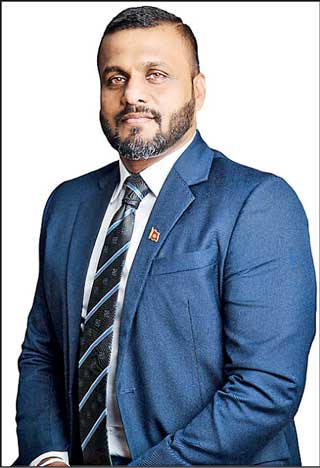Sunday Feb 15, 2026
Sunday Feb 15, 2026
Wednesday, 20 April 2022 00:00 - - {{hitsCtrl.values.hits}}
The Sri Lanka Institute of Marketing (SLIM) recently elected Nuwan Gamage as its 44th President in its 52nd year along with the New Council of Management and Executive Committee for the year 2022/23.
 |
| SLIM President Nuwan Gamage |
Gamage is the Head of Corporate Affairs and Communications at Arinma Holdings and a past Honorary Vice President of SLIM.
He has over 20 years of experience in a plethora of fields including infrastructure development, cosmetics, beauty, fashion, and education. He has vast expertise in strategic marketing, brand management, digital marketing, international marketing, corporate communication, and sustainability.
Commenting on his appointment, Gamage said: “As we are all experiencing, Sri Lanka is going through probably the worst economic crisis in its history, I firmly believe that we must have a more collaborative approach with all the relevant stakeholders to take this nation out of this situation. “Nation Branding is an exercise where a country aims to build, enhance and manage its reputation on the global stage. It presents the country with the opportunity to be better positioned to deal with foreign nations and build stronger relationships which in turn would benefit the nation economically by means of greater investments, more tourism, higher value and demand for its products and services, attract talented, creative workforce and enhance its influence on the world stage.”
Gamage went on to say: “I look forward to working with the extremely diversified Council of Management and the Executive Committee of SLIM to Develop the Nation branding blueprint for Sri Lanka with the support of the relevant government agencies and private sector expertise.”
The vision for SLIM is ‘to lead the Nation’s efforts towards economic prosperity and its mission is ‘to establish marketing as the driving force which enhances business and national value’.
In order to drive and align with this vision and mission, Gamage has a six-pillar plan which he plans to implement to its full effect during his tenure.
The six pillars are future-proof education, entrepreneurial marketing, sustainable marketing, digital marketing ecosystems, national Level research, and advocacy, which encapsulate a developing nation branding blueprint.
In terms of education, Gamage believes that focusing on providing knowledge, training, and skills is vital to stabilise the future of the country. Focus on these aspects is necessary to enable learning in a stable yet enduring manner; this helps change the students’ attitudes and enhances their confidence and helps develop the set of skills required in 2030. In the same vein, Gamage believes that developing a collaborative programme for small businesses and start-ups to help them with seed funding, mentoring, training, and providing growth opportunities will go a long way in their initial stages and help the economy greatly.
It is also his intention to initiate sustainable marketing practices in Sri Lanka by developing a green brand evaluation matrix and accreditation framework. This would encourage Sri Lankan corporates to implement the best possible sustainable practices, and encourage sustainable consumption amongst the community, which would, in turn, promote a circular economy.
He also believes that building a strong digital marketing ecosystem in the country is pivotal in making the generations to come future-ready and helping businesses thrive. Digital and social media are strong platforms for marketers and businesses to grow exponentially. It has also been at the forefront of the country’s digital transformation during the pandemic and has been at the centre of the start-up eco-system where digital natives are born.
Gamage strongly believes that research and advocacy on a national level will greatly contribute to the development of a knowledge-driven economy. He believes that engaging in public policy development and strategy formulation and research for Ministries and public enterprises will greatly enhance the country’s economic stability.
He feels strongly about the need to build and promote Sri Lanka to the rest of the world as a place people and businesses can not only visit but invest in and live in peacefully. It is a crucial part of revitalising Sri Lanka’s economy and enhancing the country’s reputation on a global scale.